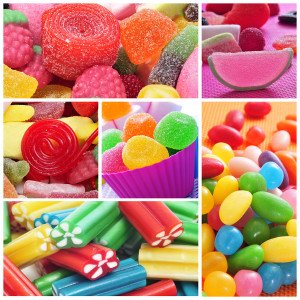Candy, Gum And Other Sweets – The Ugly Truth
 You’ve probably been warned about the dangers candy and other sweets pose to your teeth, but you may not be clear on exactly why these things are bad for you. Candy, gum with sugar and other sweets can harm your teeth in several ways that you may not be aware of. The sweet taste of these foods can encourage you to consume large amounts, which will increase the damage they do to your teeth.
You’ve probably been warned about the dangers candy and other sweets pose to your teeth, but you may not be clear on exactly why these things are bad for you. Candy, gum with sugar and other sweets can harm your teeth in several ways that you may not be aware of. The sweet taste of these foods can encourage you to consume large amounts, which will increase the damage they do to your teeth.
To start with, candy and other sweets contain a large amount of sugar, which stimulates the bacteria that occur in your mouth naturally to release acid. This acid will eventually erode the outer layer of enamel of your teeth, damaging them and creating cavities. Since a lot of candy is sticky, it can cling to your teeth and resist being washed away by your saliva, giving the bacteria more time to damage your teeth.
In addition to sugar, many candy and sweets, such as soda, contain acid which can directly harm your teeth. This acid combines with the acid that occurs naturally in your mouth and can rapidly form cavities and generally wear your teeth down. Soda is highly acidic, and contains lots of sugar, which as mentioned, causes even more acid to occur. But even diet soda is bad for your teeth because it’s just as acidic as regular soda. Any candy or other sweet that is sour tasting contains damaging acid, and should be avoided. If you simply can’t resist soda or candy, brush, floss and rinse after eating or drinking them, and consume them in moderation.
Gum deserves special mention here. Gum with sugar is bad for your teeth as mentioned above due to the fact that it causes acid production. Its sticky nature causes it cling to teeth and erode enamel. But at the same time, chewing gum helps promote saliva production, which neutralizes acid and helps wash bacteria and sugar off your teeth. That’s why sugarless gum is actually good for your teeth, as it lacks the acid-promoting sugar, while still stimulating saliva production.
The best strategy for candy, gum and other sweets is to avoid them, but many of us like to have them once in a while. As long as you brush, floss and rinse after eating them, their ability to cause damage is limited. Be sure to eat foods that are healthy for your teeth as well, and visit your dentist at least twice a year. By following these steps, you’ll preserve your teeth and save yourself pain and expense down the road.